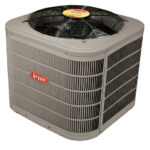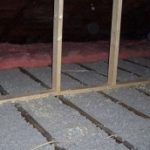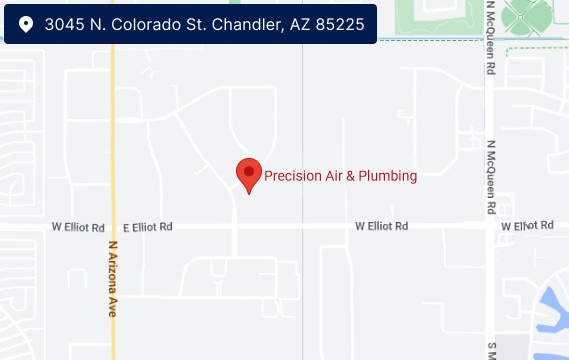HVAC Terminology You Should Know
Sometimes, you feel a little bored and decide to do some research on your air conditioning or heating system. Suddenly, you’re bombarded with a list of HVAC terminology, slang and abbreviations that make absolutely no sense. (HVAC stands for heating, ventilation and air conditioning by the way). Do you turn off your screen and run away? It’s tempting, but the good news is that you don’t have to.
If you’re trying to understand a concept and feeling stuck, the experts at Precision Air & Plumbing are here to help. Use our guide to get past the acronyms and get better knowledge of your home comfort.
Common HVAC Abbreviations and Acronyms
Like any other technical industry, the HVAC industry is chock full of acronyms that may seem like alphabet soup. We are including a few of the most common and important ones right at the top, so you can refer back to them as needed:
- AFUE: Annual Fuel Utilization Efficiency
- SEER: Seasonal Energy Efficiency Ratio
- AHU: Air Handling Unit
- BTUs: British Thermal Units
- MERV: Minimum Efficiency Reporting Value
Some of these refer to the type of machine, while others indicate the way it works. By looking at various HVAC terminology as it relates to heating or cooling, you’ll have a better understanding of how they play a role in your home.
Air Conditioning Terminology
Here in the Phoenix area, you’re much more likely to need to know about your air conditioning system. These terms help you to get more information about what is going on inside your equipment, and to help guide your decisions when you’re ready to replace your AC.
Seasonal Energy Efficiency Ratio (SEER)
The Seasonal Energy Efficiency Ratio takes the amount of cooling you can expect from a machine and compares it to the amount of electricity used. A number in the 20s is about as high as you can get, while 13 is the minimum. Of course, this ratio presumes a set temperature that may not factor in Arizona’s blazing hot summers. In that case, you can use the ratio to help compare one machine to another.
Central Air
Central air describes a cooling system that is centralized for the home, instead of using a series of disconnected units. A ductless mini-split AC system is similar in that it uses a single exterior unit to control the home’s cooling, but it’s not quite the same thing.
Split System
A split system air conditioner has an outdoor unit, usually called a condensing unit, with indoor components to cycle the conditioned air throughout the home. The opposite is a packaged unit, which has all of this equipment in one.
Air Handling Unit (AHU)
An air handling unit is one of the indoor components of a split system, and it moves air through the home. You’ll need it to run an air conditioner or heat pump. If you have a furnace, you may use some of its equipment like an air handler.
Condenser
The condenser condenses the refrigerant, which allows it to release the heat absorbed from inside the home. Heat pumps use a condenser to extract heat from the outdoors, too.
Compressor
The compressor changes the pressure of the refrigerant so that it can absorb heat from the home, and pumps it from one place to another in the system.
Evaporator Coil
The evaporator coil cycles the refrigerant through the coil as indoor air runs across it, grabbing the heat and leaving cool air behind. The coil is usually located inside, near the air handling unit.
Freon
Freon is a type of HVAC slang referring to refrigerant. Refrigerant is the key to air conditioning, as well as heating with a heat pump. Freon, or R-22 refrigerant, was phased out a few years ago. R-410A, or Puron, is a type of refrigerant used in most new air conditioners.
Variable Speed
Air conditioners have systems that control how they operate, and one with a variable speed offers you the most options. This type of system can tailor the volume of operation to maintain a higher level of efficiency.
Heating Terminology
You’ll probably also need some kind of heating system to get through the brisk Phoenix winter nights. Whether you use a heat pump or a furnace, you may need to understand these terms.
Annual Fuel Utilization Efficiency (AFUE)
The Annual Fuel Utilization Efficiency compares the amount of fuel used to a furnace or boiler’s output, represented as a percentage. The minimum is about 80%, while high-end models may have an AFUE of 98 or 99. Electric furnaces often have an AFUE near 100 because they use a different kind of energy.
Sealed vs. Atmospheric Combustion
A furnace with atmospheric combustion relies on an intake of air from indoors to generate heat. Sealed combustion furnaces use sealed pipes to draw air in and release exhaust to the outdoors. This approach minimizes the likelihood of a backdraft.
Air-source vs. Ground-source
If you use a heat pump for heating and cooling, you will have a unit that is either air-source or ground-source. Air-source heat pumps draw heat from the outdoor air, which is why they don’t tend to work as well in regions with cold winters. Ground-source heat pumps, also called geothermal heat pumps, use the heat underground, which is more constant.
Minimum Efficiency Reporting Value (MERV)
When you buy an air filter, it has a Minimum Efficiency Reporting Value from 1-16. The higher the number, the more allergens and debris it filters out.
Other HVAC Terminology
Although most of the HVAC abbreviations and slang you encounter relate to heating or cooling, there are few others you should know:
- British Thermal Units: The standard measurement of output for HVAC systems.
- Load: The amount of output you need for heating and cooling, which usually requires a professional consultation.
- Ductwork: A system of hollow tubes that your system cycles air through.
- Heat Transfer: The natural process of heat moving from one place to another, e.g. outside to inside.
Feeling Stuck on the Slang?
No one wants to feel like they’re reading a different language when they are simply trying to understand how their air conditioner or furnace works. And while knowing the terminology helps a lot, it’s not the only obstacle homeowners face. That’s why hiring expert technicians at Precision Air & Plumbing is a great idea. We can help you sort out the jargon and find solutions to your HVAC problems. If you want to know more, give us a call or schedule an appointment.









